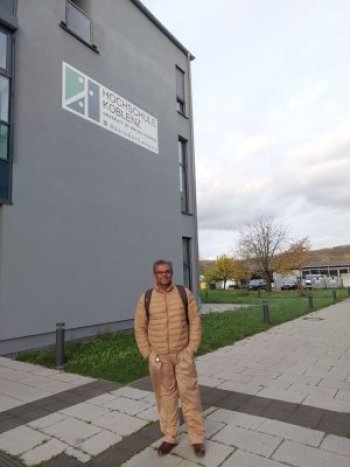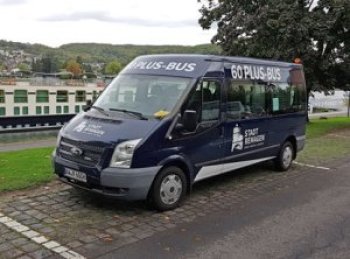For English speaking visitors
From India to Remagen for a guest lectureship with Erasmus+
I'm Victor Anandkumar, teaching in higher education since 1997 despite facing physical challenges due to post-polio residual paralysis in my left leg. Internationalization is my passion, fostering intercultural understanding and cooperation. Alongside my teaching and research in India, I lead internationalization efforts in my department, with a fruitful partnership with the Koblenz University of Applied Sciences (RheinAhrCampus) resulting in numerous student mobilities.

Me@RheinAhrCampus
An invitation from Dr. Borgmann for a 52-day teaching mobility was exciting, though I had concerns about my physical ability to cope. Comfort zones are crucial for me, thus the prospect of stepping outside mine was daunting. Learning about the real-cost application, providing additional funds for handicapped persons, eased my worries.
The Languages /International Affairs office at RheinAhrCampus was very supportive in putting together an application seeking funds to cover for the real cost. Several documents in the application process were in German but the Languages /International Affairs team painstakingly provided me with English translations of most of those documents to work on. While keeping fingers crossed, I moved forward in good faith – booked the onward air tickets (for me and my wife who has been my pillar of support), reserved an apartment in Remagen after considering several options, decided on the courses to teach and shopped for winter clothing. We were getting ready to step into the unknown. Then came the good news that the real cost application was successful and that was a very encouraging green signal for my teaching mobility at RheinAhrCampus.
A typical day during my teaching mobility:
I realized that most of the apartment accommodation in Remagen, Germany is either in the basement or the first/second floor of a building. After careful thought (including counting the steps to climb), we settled for an apartment on the first floor. It was about 250 meters from the bus stop and train station, and the nearest grocery store, and about 1.5 Km to the nearest supermarket. In the initial days, I was walking this distance. But with incessant rain and near-freezing temperatures, my mobility challenges became more pronounced. That was the time, a German Professor lent me his bicycle. With my ‘normal’ right leg, I can cycle short distances and therefore it worked perfect for me to move around, especially when it wasn’t raining. That was when someone at the Languages /International Affairs office found out about the “van transport for 60+ from your doorstep” in the mornings on working days. Though it is essentially a facility for senior citizens, it was extended on a nominal payment for a ride to handicapped persons too. Looks like the whole Languages /International Affairs team in RheinAhrCampus was conspiring to help me out and make my mobility easier. Soon I was taking that van transport for work. During my first ride, the first question from the driver was “How old are you?” since I am only 50 and I actually look a little younger ;-). But he qucikly understood my handicap and was very helpful. That was one special experience.

My transport to work… the 60 plus van made my commute easy!
My walking with a limp caught the attention of many in RheinAhrCampus. I remember a conversation with a student who asked about my handicap and then I told him that I had polio. His response shocked me – What is polio? – Then I realized that life in a developed country is very different from the developing country that I come from. I found the Germans to be quite sensitive to my requirements and challenges. That made my life easy, especially in public spaces, public transport, supermarkets and so on.
If there is a handicapped professor or a student considering taking up a mobility in Germany, my advice is GO FOR IT! The Erasmus+ stay with real cost provides for the actual expenses. As a result, one need not worry about over-spending on the limited regular scholarship. Real-cost is for real! And it covers the actual additional expenses a handicapped person will incur during the mobility period.
My rating of the host university: 5-stars!!!
- RheinAhrCampus was a compact campus and therefore I could easily move around independently – to the classrooms, to the cafeteria, to the library, to my shared workspace, to international relations office, to large ‘hybrid’ classrooms – as well as to and from the bus stop. Every feature and all buildings were accessible for me.
- The Languages /International Affairs office anticipated my needs related to both work (for example, support of a course assistant, orientation about office facilities) and non-work (for example, search for an accommodation, need for airport pick-up on arrival). Such a planned handholding and onboarding helped me to focus on my preparation without being worried or uncertain about my requirements.
- RheinAhrCampus has a very active GreenErasmus program by which used-but-in-good-condition clothes, kitchen utensils, home utility products are made available for exchange students and lecturers. It helped us to carry less luggage knowing in advance that we will be able to find some winter clothes and other items there through GreenErasmus.
My teaching experience: 5-star rating (again)
- Teaching courses aligned with my expertise, like Southeast Asian Business Culture, allowed me to impart knowledge confidently and authentically due to my experiences in the region.
- International Marketing was another course I taught well, drawing from my extensive international background.
- Both experiences were professionally fulfilling, with diverse classrooms enriching the learning environment.
Challenges during Erasmus stay and coping strategies:
Weather: Balancing outdoor and indoor activities in cold weather was crucial, requiring me to adapt to winter clothing and utilize accessories like hand warmers for comfort.
Mobility: Mindful management of walking distances and breaks helped me cope, especially during train journeys with platform changes and stair climbing.
Public transport: Crowded trains posed challenges but having a companion to navigate space and assist made travel less stressful.
Social interactions: Limited mobility restricted outdoor activities but having my wife as a constant companion ensured emotional and physical support during social events.
On-site infrastructure: While RheinAhrCampus was largely accessible, improvements to outdoor pathways during wet weather could enhance safety. Facilities like elevators and anti-slip measures in buildings eased navigation.
Tips for funding recipients:
- Early approval of real-cost applications can save money and reduce anxiety.
- Ensure all costs, including accommodation, are confirmed and finalized in advance.
- Take advantage of travel deals like Deutschland Tickets for affordable public transport.
- If accompanied, seek professional assistance for visa processes.
- Plan vaccinations for flu and pneumonia before traveling to Europe in winter.
Reflection: Returning to India after Erasmus teaching, I feel wiser, more confident, and deeply grateful for the experience, embracing diversity with satisfaction.
